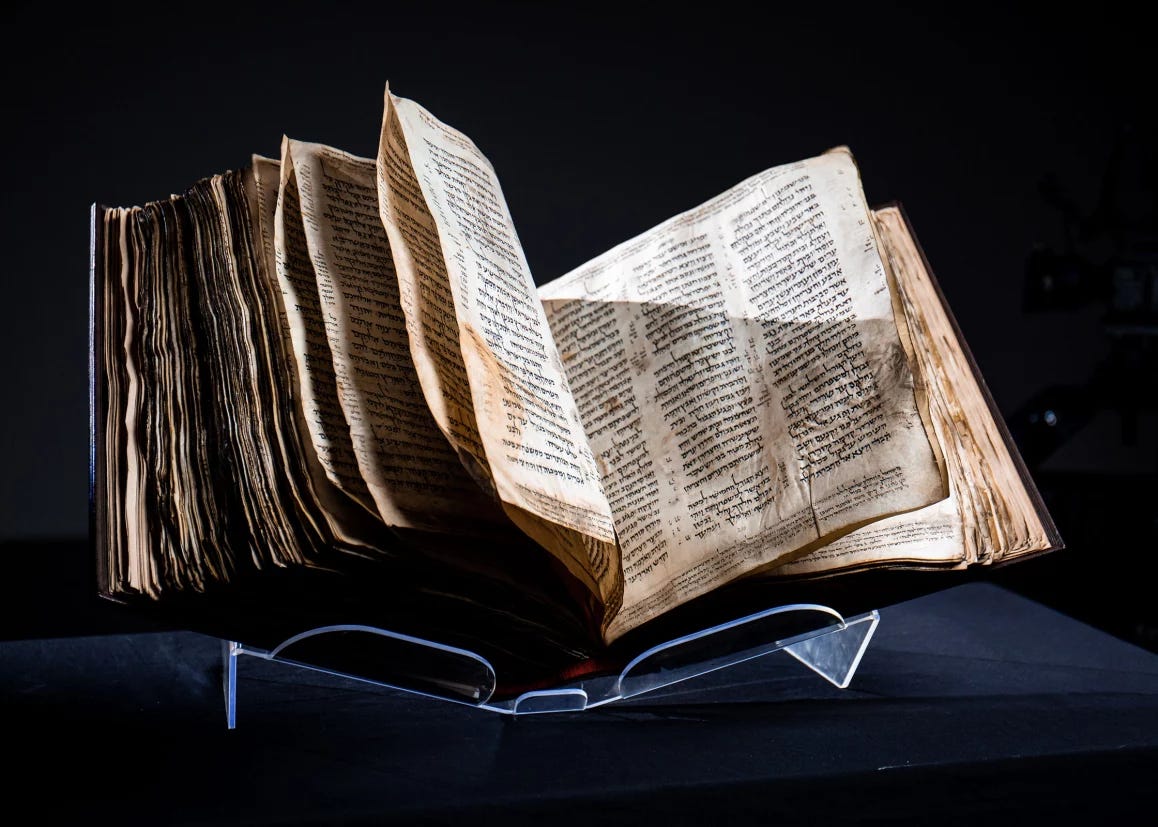The Irresistible Physicality of Books
The Most Expensive Book Around, Coffee-Stained Books, Reading in the Tub, Salvaging Wet Books, More
¶ The price of antiquity. A decade ago the British Library bought the St. Cuthbert Gospel, a seventh-century copy of John’s Gospel buried with the saint and preserved with its original red-leather cover. Assumed Europe’s oldest intact book, the gospel set back the institution $14 million. I mention the Cuthbert Gospel for the sake of comparison. The Codex Sassoon, now headed to a Sotheby’s auction, is projected to fetch at least twice, maybe thrice, that price and possibly even more. But the bookish are buzzing for reasons beyond the potential price tag.

The famous Aleppo Codex—the earliest witness to the Masoretic text tradition of the Hebrew Scriptures—is probably a smidge older, but it’s missing just over a third of its pages. Sassoon is missing just a few and represents all 24 books of the Jewish canon. Sassoon is about eleven hundred years old and thus also represents the primary textual witness between the Dead Sea Scrolls and the medieval period, a centuries-long stretch when Hebrew Scriptures more or less went underground. The New York Times has an excellent story on it, as does the Times of Israel.
Update, May 17, 2023: Sassoon sold for $38.1 million. Not too shabby.
¶ The stuff of ideas. I’ve been reflecting a lot on the physicality of books lately: everything from the importance of print-and-paper libraries to the technical achievement of the bookcase as an advanced and underrated user interface. Here are some of the posts I’ve written on the topic:
The physicality of books is part of their appeal and value, as exceptionally rare books like the Codex Sassoon demonstrate. I thought, however, for the rest of this post I’d share some more accessible and immediate aspects of books’ materiality—like when browsing through your shelves or dropping a novel in the bath.
¶ The joy of handling your books. “Pulling down and replacing every book on your main shelves can be a kind of ritual, a trip down memory lane that reminds you, in brief flashes and long reveries, how you got to where you are,” says Molly Templeton. “Take the books off the shelves. Dust them, thumb through them, find yourself surprised about what you do and don’t remember.”
¶ Reading in the tub. I read in the bath almost every day. It’s risky business, but it’s worth it. I’ve been doing so as long as I can recall and have lost only three volumes so far. Twice I fell asleep and dropped the book in the water—that happened once while reading my psalter. Amazingly, I’d just finished reading Psalm 123. “Had not the Lord been among us,” to quote Donald Sheehan’s translation, “the waters would have drowned us. . . .” Another time, I jostled my book and, while grabbing it to prevent a full soak, knocked my coffee mug, which I then lunged to stabilize but which splashed both me and the book, the shock of which then sent the book into the water anyway. Glug, glug.
¶ What to do with a wet book? I placed paper towels between each page of the psalter and gently pressed the water out of the book. I also buried the book in a large bowl of rice—yes, the accidentally-dropped-my-cell-phone-in-the-toilet method—in hopes that it would draw moisture out of it. It mostly worked; pages near the front and back are a bit warped and wavy but not too bad for a book that dropped as low as Red October. The rice might have been a mistake, according to Amy Guth. She recommends, “plac[ing] the book upright with pages fanned out and allow to air dry for several days, ideally in a well-lit and airy spot.” She also recommends gently ironing the pages.
¶ Coffee-stained books. I often drink coffee while reading. I can’t say how many books I’ve ended up staining under a toppled mug. Happens to the best of us, I reassure myself; of course, I’m always grateful for evidence of the claim. Suffice it to say, our heart goes out to Laura.


Then again, I also take the coffee stains as evidence of Laura’s obvious affection for her books. Like the saying goes, we only hurt those we love.
¶ Cleaning books. Sometimes books pick up dirt and grime from handling. When I worked at a used bookshop in college, we cleaned every book that came into the store. The covers of most books sport protective lamination, which can be wiped down with a damp rag or glass-cleaning spray and paper towel to rid it of dust, handprints, smudges, stains, and the like. More caustic adhesive removers might be needed to rid books of criminally-overused stickers; it’s usually worth the trouble and renders volumes more pristine and enjoyable to handle. What about nastier situations like mold and insects? Try, says Danielle Calma, putting your books in the freezer.
¶ Smelly books? I buy a lot of used books. Every now and then I’ll get a stinker. Once I bought a copy of Perry Anderson’s Passages from Antiquity to Feudalism that smelled like patchouli. (Hippies aren’t know for their interest in medieval history, are they?)
Other times, I’ve purchased books that smell mildewy or exude the scent of cigarette smoke. If you run into that problem, here’s a clever hack that might work for you: dryer sheets.
What about my patchouli-tinged tome? I left it as is; I rather like patchouli.
¶ Proper care and handling. Some advice from the July 31, 1852, issue of Notes and Queries: A Medium of Inter-Communication for Literary Men, Artists, Antiquaries, Genealogists, Etc. I’ve excerpted a few handy tips from the column entitled, “Notes on Books and Bindings.“
5. Never brand books in unseemly places or deface them with inappropriate stamps.
18. Do not allow your books to get damp, as they soon mildew.
19. Do not allow books to be very long in a too warm place. Gas affects them very much. . . .
22. Do not, in reading, turn down the corners of the leaves; do not wet your finger to turn a leaf, but pass the fore-finger of the right hand down the page to turn over.
23. Do not allow foreign substances, crumbs, snuff, cards, botanical specimens, to intrude between the leaves.
28. Never pull a book from the shelf by the head-band; do not toast them over the fire, or sit on them, for “Books are kind friends, we benefit by their advice, and they reveal no confidences.”—Luke Limner.
¶ Thank you for reading! If you know anyone prone to dropping books in the bath, splattering them with various beverages, or exposing them to unsavory odors, please share Miller’s Book Review 📚 with them. They’ll thank you and say great things about you behind your back.
If you’re not a subscriber, take a moment and sign up. It’s free for now, and I’ll send you my top-fifteen quotes about books and reading. Thanks again!





“Do not toast them over the fire...”🤣 I’ve actually done that to dry out a book I dropped in the snow. What a great article--I love my books! They are my friends, and I try to keep them in tip top shape. But since I have so many, I am constantly lending them out. Which brings me to my question... can you write a post giving us ideas on how to reclaim our books from our friends?! 😁
This post just makes me want to go to an old bookstore just to smell the books when I walk in.